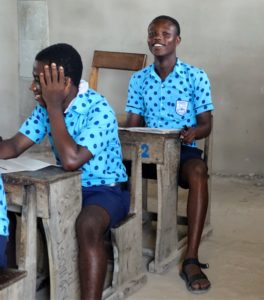Access to education decreases risk of re-trafficking
At Challenging Heights, we believe in and support the protection of children’s rights, particularly their right to an education. We’ve seen that children who are in school are less likely to be trafficked, or even re-trafficked. By ensuring children’s access to education, whether it was through advocating for the elimination of school fees more than 10 years ago or our current focus of addressing corporal punishment in schools, we have been working at a very broad level to protect this right for children.
Our national and municipal level policy advocacy does not preclude support on an individual level either. A big part of the rehabilitation and reintegration of the children that we rescue from modern slavery is education. While at the shelter, the children all attend school in the on-site classrooms. There they learn basic literacy and numeracy skills. In many of the exit interviews that we conduct upon the children’s reintegration, many of them say that their biggest change was in their ability to write their name and other academic achievements
However, our support for their education doesn’t end upon their reintegration. Often, the children return home on a Thursday or Friday, allowing them a weekend with their families to relax and enjoy. Then, on Monday morning, our reintegration officers set off to help enrol the children in their nearest school. We talk with the headmaster and the teacher, to help them understand the child and some of the challenges they may face, since for many it is their first time going to school. We then find out from the school what school supplies are required. Later in the week, we return with all of the necessary school supplies and a seamstress to take measurements to make their new school uniforms.
This support for our reintegrated children, keeping them in school, significantly lowers their risk of being re-trafficked. Not only that, but with this level of support, the majority of families are also then able to ensure that all of their other children are enrolled in school as well. This goes a long way in promoting change among the community and helping to foster a value of education, which in turn can help to prevent trafficking.
